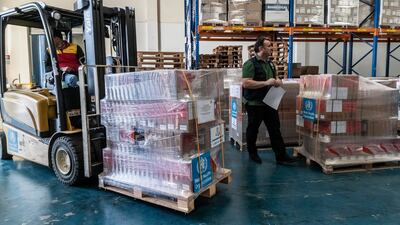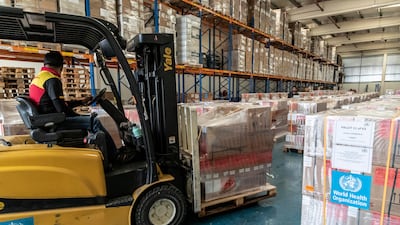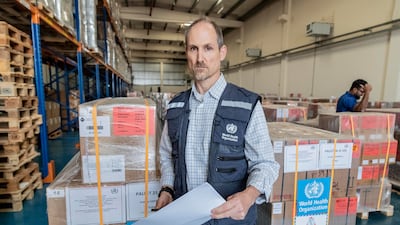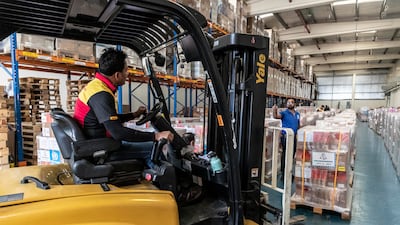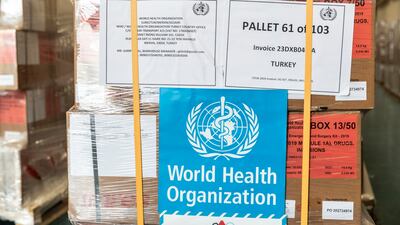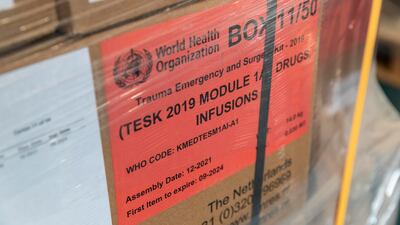Follow the latest on the earthquake in Turkey and Syria
The first cargo plane with emergency medical aid has left Dubai to bring relief to about 23 million people affected by the two powerful earthquakes that struck near the Turkey-Syria border on Monday.
The cargo plane bound for Istanbul left Al Maktoum International Airport on Wednesday evening transporting 37 tonnes of medical kits.
Additionally, International Humanitarian City (IHC) is facilitating another relief flight to Syria to deliver crucial aid.
Both flights carrying 74 tonnes of health kits and medical equipment supplied by the World Health Organisation were scheduled to land in Damascus and Istanbul on Wednesday evening.
More than 10,000 people are now thought to have died after the powerful quakes, which were followed by a series of aftershocks.
chairman, IHC Supreme Committee
Pallets of emergency surgical kits and medical supplies worth almost $600,000 were stacked at International Humanitarian City on Tuesday in preparation for aid flights.
From there, they were taken to Al Maktoum International Airport and loaded on to a Moalem Aviation flight bound for Syria and an MNG Airlines plane headed for Istanbul to assist the global relief effort.
Emergency response teams on the ground will receive supplies and transfer them to areas most in need of help.
“Once the shipment arrives, they will be managed by a local clearing agent through customs officials and handed over to the WHO team on the ground,” said Robert Blanchard, an emergency response operations manager from the World Health Organisation’s logistics team in Dubai.
“They will then work with local co-ordinators to distribute the aid packages as quickly as possible to where they are most needed.”
Major relief efforts under way
The flights are the most recent sent to the disaster zone, and follows several aid missions that left Abu Dhabi this week with search-and-rescue teams on board to help in the immediate recovery operation in Adana and Gaziantep.
Rescue operations are likely to be hampered by damaged infrastructure in the worst-hit areas of north-west Syria and south-east Turkey where temperatures have plummeted to -10ºC in recent days.
A cholera outbreak is also causing serious health concerns to those crammed together in makeshift shelters, after dozens of buildings and apartment blocks came crashing down in the initial earthquake, and substantial aftershocks.
While medical aid drops are the primary concern of humanitarian agencies to treat the wounded, shelter and urgent supplies of food, clean water and other essentials have also been sent out from humanitarian centres.
"The IHC stands firmly committed to providing the people affected by the earthquakes with the humanitarian support and resources they need,” said Mohammed Al Shaibani, chairman of the Supreme Committee for the Supervision of International Humanitarian City.
“We are taking urgent action by facilitating airlifts of vital medical supplies from the World Health Organisation to address the pressing demand for medical aid in the affected regions.”
Search-and-rescue teams from the UK have also landed in Gaziantep in Turkey, 97km north of Aleppo.
A team of 77 specialists and four trained search dogs joined the effort to search for survivors in the rubble of decimated towns.
They were accompanied by an emergency medical team to conduct a full assessment and treat the injured.
International support
Experts have been seconded from 14 fire and rescue services from across the UK, and will use seismic listening devices, concrete cutting and breaking equipment; and heavy duty propping and shoring tools to cut into damaged buildings.
The team is self-sufficient and provides its own food, water, shelter, sanitation, communications and all necessary equipment to undertake search-and-rescue operations.
Meanwhile, in north-west Syria, the UK-funded White Helmets continue to carry out a significant search-and-rescue response and have mobilised all their resources to respond to emerging needs.
The UK has given the White Helmets £2.25 million ($2.72 million) in the past year and an additional funding uplift of £800,000 for frontline search-and-rescue operations.
